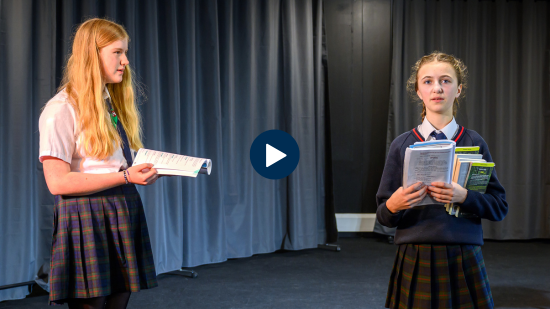Why should I study this subject?
GCSE Drama is an exciting and dynamic course that develops pupils’ creativity, confidence and communication skills. Through collaborative practical work, pupils learn to express ideas effectively, work as part of a team and perform with assurance in front of others.
The skills gained through studying Drama are highly valued across a wide range of careers, including business, marketing, customer services, law, teaching and many other sectors. Most importantly, creating and performing drama gives pupils a unique sense of achievement and enjoyment that cannot be replicated in any other subject.
The course offers a balanced combination of practical and theoretical study. Pupils develop key analytical and evaluative skills as they explore plays and performances, gaining transferable skills that support success across their GCSE studies and beyond.
What will I study?
The subject content is divided into three components:
- Understanding drama
- Devising drama
- Texts in practice
How will I be assessed?
The exam board for drama is Edexcel and assessment consists of two non-examination assessment (NEA) components in addition to one written exam paper.
Component 1: Devising
- Create and develop a devised piece from a stimulus
- Performance of this devised piece or design realisation for this performance
- Analyse and evaluate the devising process and performance
- Pupils submit a portfolio covering the creating and developing process and analysis and evaluation of this process (45 marks) and a devised performance/design realisation (15 marks)
- Total 60 marks – 40% of GCSE
- Timescale: The performance and written portfolio is completed by the end of Year 10
Component 2: Performance from text
- Pupils will either perform in and/or design for two key extracts from a performance text
- Externally assessed by a visiting examiner
- 48 marks – 20% of GCSE
- Timescale: Extracts are introduced at the start of Year 11 and performances examined before Easter
Component 3: Theatre makers in practice
- Written exam covering practical exploration and study of a set performance text, and evaluation of a live theatre performance that they have seen
- Exam duration: 1 hour 45 minutes
- 60 marks – 40% of GCSE
- Timescale: The performance text is studied throughout Year 10 and 11. We see a live theatre production at the start of Year 11, but this component is not examined until the end of the course
Are there higher and foundation tiers?
No. All students sit the same exam and study the same content, with questions designed to allow achievement across the full range of grades (9–1).
Are there any field trips or enrichment opportunities?
You are required to watch at least one live theatre production for the written exam. The drama department runs an annual trip to the theatre which is open to Year 10 and Year 11.
Will this course be good preparation for post-16 study?
GCSE Drama is strong preparation for post-16 study as it develops confidence, creativity, and effective communication skills. Students learn to collaborate, analyse texts, and reflect on their own work, building independence and resilience that support success in A Level Drama and other performance or creative courses.
Is GCSE Drama just about performing on stage?
There is a lot more than just performance skills to be gained from this GCSE. The course covers all elements of theatre production, from acting and directing to designing set, costume, lighting, and sound. While there will be a lot of acting and performing, the course also allows students to explore other elements of theatre.
What are the next steps?
To study GCSE Drama, you will need to choose it from the Option 2 block. For further information about the subject, please email




